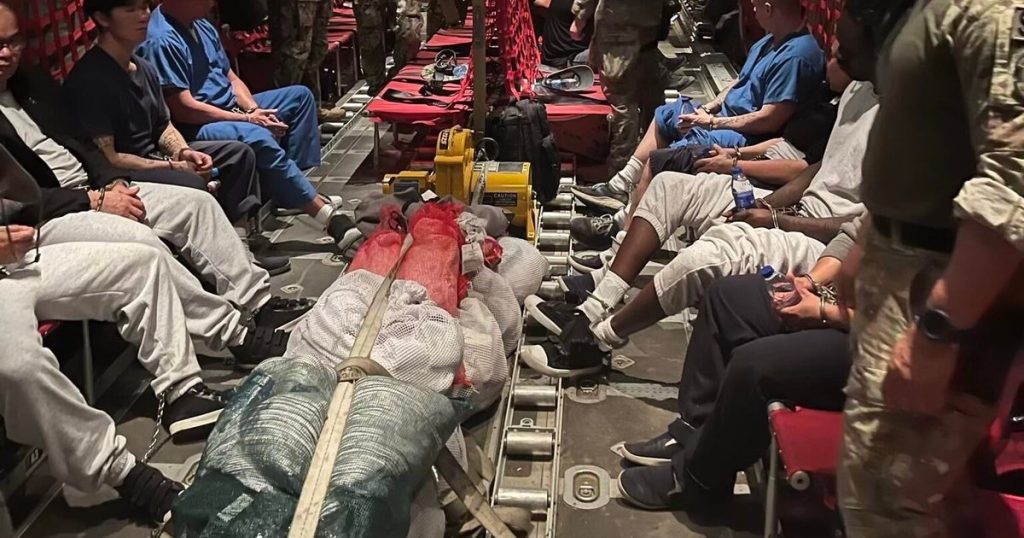The deportation of eight men convicted of serious crimes from the United States to South Sudan marks a significant escalation in the Trump administration’s zero-tolerance approach to illegal immigration. After a prolonged legal struggle that kept the individuals confined at a military base in Djibouti, the deportation was executed just before midnight EST on Friday. Human rights advocates have raised alarms regarding the potential dangers these men face upon their arrival in a country noted for its safety concerns.
| Article Subheadings |
|---|
| 1) Overview of the Deportation |
| 2) Background on Legal Battle |
| 3) Implications for U.S. Immigration Policy |
| 4) Concerns over Human Rights |
| 5) Future of Deportations to Conflict Zones |
Overview of the Deportation
The deportation flight that transported the eight men from the United States to South Sudan has taken considerable time to organize, involving multiple layers of legal and diplomatic maneuvering. All eight deportees were convicted of serious crimes, including murder and sexual assault, yet none of them held citizenship in South Sudan. Their deportation is moving away from traditional norms, challenging agreements that usually prevent countries from accepting individuals who are not their citizens.
Background on Legal Battle
For weeks, the fate of these men was subject to a contentious legal battle. Advocates for their immigration rights contended that the deportations were unjust, arguing the men had already served their prison sentences and deserved to remain in the U.S. The legal standoff intensified when U.S. District Judge Brian Murphy issued a ruling that required the administration to offer the detainees adequate notice and opportunities to contest their deportation. However, the Trump administration appealed to the Supreme Court, which ultimately allowed the deportations to proceed.
Implications for U.S. Immigration Policy
The deportation of these eight individuals is being interpreted as a political triumph for the Trump administration in its ongoing efforts to reshape immigration policies. This event signifies a new aggressive stance that diverges significantly from previous U.S. policies, which typically restricted deportations to the countries of citizenship. The administration aims to convince other nations, irrespective of their human rights records, to accept deportees who aren’t their own nationals, potentially laying groundwork for future deportations.
Concerns over Human Rights
Human rights groups have expressed alarm over the deportations, raising valid concerns about the potential treatment of the deportees in South Sudan, a nation embroiled in conflict and political instability. Lawyers associated with various advocacy groups argue that deporting individuals to a country where they could face torture or mistreatment violates due process. The State Department has consistently issued travel advisories against visiting South Sudan, highlighting the dangers present in the region.
Future of Deportations to Conflict Zones
The deportation of individuals to countries facing severe instability poses several questions about the future of U.S. immigration practices. As more countries may be pressured into accepting convicted felons who are not their citizens, the ethical implications come to the forefront. Advocates are concerned about a potential precedent being set for future deportations, raising fears that other vulnerable individuals may also be sent back to conflict zones without adequate consideration for their safety.
| No. | Key Points |
|---|---|
| 1 | Eight men were deported to South Sudan after serving sentences for serious crimes. |
| 2 | The deportations follow a lengthy legal struggle that ended in a Supreme Court ruling. |
| 3 | This event represents a shift in U.S. immigration policy concerning deportation practices. |
| 4 | Human rights advocates warn of potential dangers the men could face in South Sudan. |
| 5 | The actions may set a precedent for future deportations to unstable countries. |
Summary
The recent deportation of eight men to South Sudan introduces serious questions about the future of U.S. immigration policy and human rights considerations in deportation practices. As advocates express concern over the treatment these individuals may face, the event stands as both a significant moment for the Trump administration and a troubling signal for the complexities tied to international obligations and human rights.
Frequently Asked Questions
Question: Why were the men deported to South Sudan?
The men were deported as part of the Trump administration’s crackdown on illegal immigration, despite having no ties to South Sudan. They were convicted of serious crimes in the U.S. and are viewed as part of the administration’s effort to rid the country of individuals deemed dangerous.
Question: What legal challenges did the deportees face?
The deportees engaged in a protracted legal battle that involved multiple court rulings, including a notable decision by U.S. District Judge Brian Murphy, who mandated that the men be given the opportunity to contest their deportation.
Question: What are the risks involved in deporting individuals to conflict zones like South Sudan?
Deporting individuals to countries engulfed in conflict raises significant ethical concerns regarding their safety and well-being, as there is a risk of torture or jail time upon their return. Advocacy groups argue that such acts reflect punishments rather than lawful deportations.


